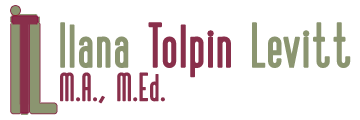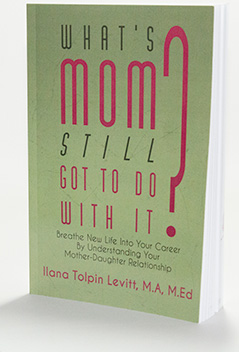WORKSHOP DESCRIPTION
We begin the workshop with personal introductions and we ask participants to share their reasons for coming and their expectations. Then we pass out an accompanying outline and discuss our goals and objectives for the seminar. We distribute a cartoon by Jules Feiffer in which a mother does everything differently from her own mother in raising her daughter. To her amazement and distress, her daughter turns out to be the exact image of her own mother!
Ilana then recounts her experience with her own career development to provide a personal example of her own separation struggles. She explains to the group that she remembers being quite motivated by not wanting to have the same career path as her mother. It was a rebellious attitude that precluded exploration of her own interests, skills and values, or thinking about the meaning of her mother’s work as a social worker and psychoanalyst. In the end, she made several choices that were also in the field of psychology, but in very different areas. She discusses the amazement she experienced when she first realized she was using her mother’s office and sitting in her mother’s chair, for her part-time private practice in career counseling.
By this time, participants seem more relaxed having heard others reflect similar or worse problems than their own. The cartoon adds comic relief while Ilana’s story humanizes the leaders.
The second part of this workshop aims at educating the participants regarding the special nature of the mother-daughter relationship, emphasizing the unique dynamics that Mother-Daughter Workshops contribute to this intense, intimate union. Leah proceeds to speak about women’s development from birth to adulthood using theoretical formulations from Mahler (1975), as well as research on gender differences compiled by Notman and Nadelson (1990) and Gilligan (1990). Ilana speaks of the family system and how it impacts upon the mother daughter relationship. This aspect of the presentation is done in lecture/discussion format. Participants are encouraged to contribute experiences that relate to the discussion, and verbal as well as non-verbal reactions are addressed. This part of the seminar can last from one quarter to one half hour, depending on the interests of the group, the time frame, and the group composition. This discussion frequently leads to greater group cohesion through lively discussion and interaction among participants.
WOMAN’S DEVELOPMENTAL THEMES
Three developmental themes emerge in these workshops: identification, individuation, and separation. By identification, we mean the unconscious process in which an individual incorporates within herself a mental picture of an important person, and then thinks, acts, and feels as she imagines the person to feel, think or act. By individuation, we refer to a process that starts from birth, in which intrapsychic autonomy develops with ego functions such as perception, memory, cognition, and reality testing. By separation, we mean a differentiation of self from other that includes distancing, boundary formation, and disengagement, and which ultimately paves the way for object relationships and true autonomy. (Notman, 1990) These three processes are ever present in the interplay of the mother-daughter relationship. The manifestation of these three processes differs for men and women.


